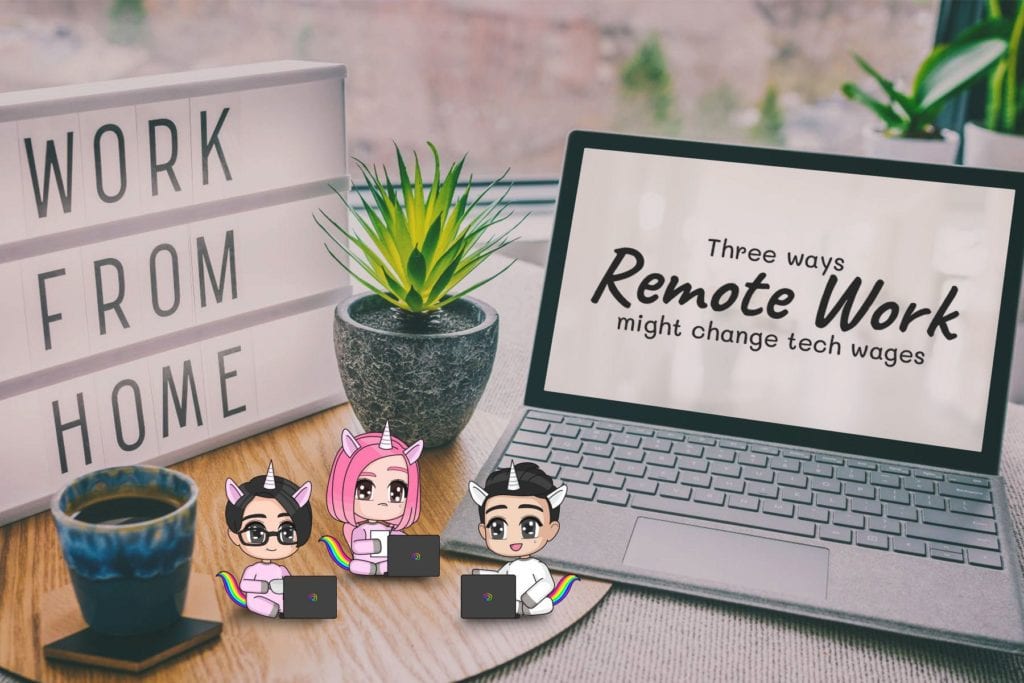Three ways remote work might change tech wages

Over the past few years, the tech industry has grown fast and has impacted every other sector around the world. After the coronavirus lockdown, tech professionals became indispensable for every company. They played an essential role in helping companies to survive. As a result, more companies began to offer remote positions to attract and retain qualified talent.
For many people, remote work is just a new trend. But, according to Payscale’s Compensation Best Practices Report, more companies have embraced remote work as a benefit year after year. In 2017, about 39 percent of companies offered remote positions. But, in 2019, over 45 percent of companies provided remote jobs. Although working from home has been delightful for many workers, it has significantly impacted tech wages. If you want to know how tech salaries have changed, here are three ways remote work is impacting tech professionals’ earnings.
Before COVID-19
According to Hired’s 2020 State of Salaries report, tech salaries were skyrocketing before the coronavirus outbreak. In the US, a tech professional could earn, on average, USD 146,000 per year, and across the globe, the average salary was USD 130,000. However, in San Francisco, salaries were even higher. With an average salary of USD 155,000 per year, the Bay Area reported a salary growth of 7 percent.
In the healthcare sector, salaries were healthier than ever. The typical salary of a tech professional working in the healthcare industry was USD 151,000 in the US. Simultaneously, in the UK, the average salary was USD 87,000, making healthcare tech workers the best paid worldwide.
Hired’s report also shows how salaries reported a significant growth in specific roles. For example, In 2017, the average salary of a data scientist was USD 135,000 per year. But, in 2019, data scientists’ average salary increases to USD 139,000. Hence, learning data science skills is a great alternative to improve your wellbeing.
Location-based salaries
During the coronavirus lockdown, employers went even further by providing not only amazing salaries but awesome perks to tech professionals. However, with wages increasing more and more, the age-old calculation came up. Remote workers began to think about relocating. Although several could move to a city with a lower cost of living and keep the same salary, this wasn’t a reality for most tech professionals.
To prevent tech professionals from moving, big tech companies began to implement location-based policies. In that case, if you’re planning to move to a city with a lower cost of living, your salary will be adjusted depending on your location. According to Hired’s report, tech workers are split on supporting localized salaries. Despite the fact that most tech professionals think jobs should be paid the same regardless of their location, only 32 percent of surveyed candidates said they would accept a lower salary.
Lack of transparency – a threat to tech professionals’ expectations
For years and years, many organizations have worked hard to achieve salary equity and transparency in the workplace. Nonetheless, Hired’s report demonstrates how existing initiatives aren’t making a significant change. In that case, there’s no doubt that there’s still work to do. According to Hired’s 2020 State of Inequality report, over 60 percent of the time, female tech professionals are offered lower pay than their male counterparts with the same skills and role.
At the same time, salaries may depend on your race as well. Hired’s report shows how Black tech professionals are offered lower wages than their white, Hispanic, and Asian counterparts. Nevertheless, it’s even more discouraging how the expectations of Black tech workers are also affected. On average, a Black tech employee expects to receive a salary that’s USD 9,000 less than the expected pay of a white tech worker with the same job title and skills.
Schedule flexibility – a new challenge to retain top tech talent
While remote work is gaining more ground, more workers are asking for a remote position. During the coronavirus lockdown, most tech professionals worked from home full time. But, Hired’s 2020 State of Salaries report shows that tech talent wants the best of both worlds. In fact, most tech professionals would go back to the office on their own terms.
According to Hired’s report, over 50 percent of surveyed candidates would like to be in the office at least 2 or 3 days per week. Hence, companies will need to provide employees with schedule flexibility. Otherwise, they may struggle to attract and retain top tech talent.
Conclusion
Remote work is here to stay, and in the next few years, companies will offer even more remote positions. Although remote work may impact tech salaries’ growth rate, starting a new tech career is still an excellent way to increase your job opportunities. Therefore, if you’re looking to enroll in a coding bootcamp, you should visit Bootcamp Rankings. On this site, you’ll find a list of the best coding bootcamps in the US. On the other hand, the tech market will continue to grow since digital tools are now crucial to meet customers’ needs.








Responses